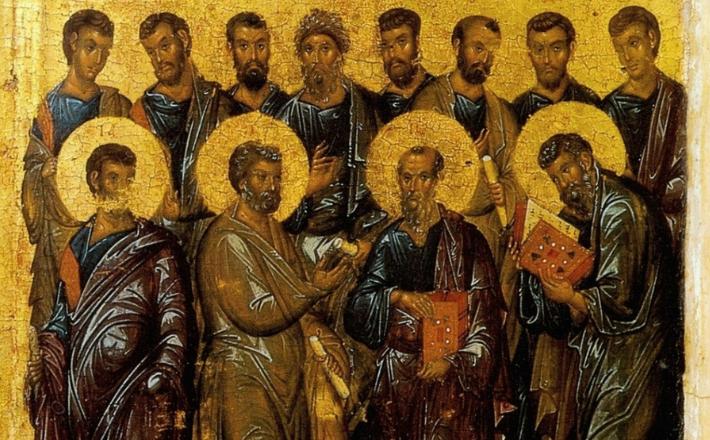Commentary on Acts 15:1-18
Today’s reading relates what causes the Apostolic Council, or Jerusalem Conference, to meet and includes most of its proceedings. The council deals with whether gentiles must become full proselytes to Judaism to be saved. The lectionary readings of the previous weeks have not prepared the congregation for why this issue would arise.
But Acts 10–11 tells of the conversion of the first gentiles. Up to that moment, all church members were Jews or Samaritans, people closely related to Jews and who have a form of the Torah. The acceptance of Cornelius into the church as a gentile was contested, but he was accepted because Peter saw God’s Spirit come on him as it did on the apostles at Pentecost. This showed that God approved of Cornelius’s acceptance. Some in the Jerusalem church accepted him only as an exception. As our reading today shows, they were not willing to see him as a precedent. After the conversion of Cornelius, we hear that the church in Antioch gains many gentile members (11:19–30).
That church also commissions Barnabas and Paul to go on what we often call Paul’s first missionary journey. That mission activity brought so many gentiles into the church that it provoked some in the Jerusalem church to demand that gentiles become full proselytes to Judaism, seemingly because they thought their presence challenged the identity of the church as a movement that was faithful to God’s law. That is where our reading picks up the story.
These church members from Jerusalem go to Antioch and demand that gentiles be circumcised and keep the law as Jews keep it. After “no small dispute,” the leaders at Antioch send Paul, Barnabas, and some other members (seemingly including Titus [Galatians 2:1]) to Jerusalem to discuss the matter with the leaders there. On their way they tell churches outside Judea how God has included gentiles, and the news is received with joy.
Once Paul, Barnabas, and the others are in Jerusalem, the church gathers and some church members who are also Pharisees assert that gentiles must be circumcised and keep the law as a sign that they are God’s people. (We should note here that a person could be both a Pharisee and a believer in Christ. That should temper what Christians often say about Pharisees.)
The apostles and elders of the Jerusalem church seem to go into executive session to discuss the matter. After significant debate Peter reminds the assembly of the Cornelius episode, saying that it shows that full proselyte conversion is not needed because God has already given gentiles the Spirit. Barnabas and Paul give more evidence from their mission trip that the Spirit has indeed been given to gentiles. James gives the final evidence from prophecy, saying that it confirms that these experiences of the Spirit show God taking a people from among the gentiles into the people of God, into the “tent of David.”
The decision is made that proselyte conversion is not necessary for salvation. The council does call gentiles to adhere to some things that will make it easier for Jews and gentiles to associate with one another (15:19–20), but those things are not conditions for salvation.
This debate is not between legalists and those who believe in grace, or between the open-minded and the closed-minded. It is about how church members must weigh their religious identities. We all have multiple identities. We are mothers and daughters and teachers and students, et cetera. We are all of these things all the time, but in different settings one or the other of these identities must take precedence. Sometimes we need to be more the student and other times more the teacher, and so on. The question at the Jerusalem Conference is whether being Jewish or believing in Christ takes precedence when the church gathers.
Those who want church members to be circumcised and law-observant see believing in Christ as a secondary identity to being Jewish. Thus, everyone who believes in Christ must first be Jewish. Paul and those who reject that demand see believing in Christ as the most important religious identity; all other kinds of religious identity must be secondary. So it matters less whether one is Jewish because being Jewish is a subcategory of being a Christ-believer. Some will be Jewish, others will not.
The council sees the centrality of trusting in Christ for salvation as the issue that is at stake. After accepting that salvation is through Christ, Jewish members can live out that salvation by being observant Jews, but gentiles live out that salvation as gentiles. Paul will say in Romans that this must be the case because if everyone must become Jewish, it suggests that God is only the God of Jews rather than of the whole world (Romans 3:27–31). Important theological matters are at stake here.
This story highlights the inclusive nature of the gospel. What brings a person salvation is trusting in Christ, no matter what else shapes her identity. This first council meeting emphatically makes the point that all kinds of people are invited into the community that bases its identity on faith in Christ. This means that the church should be a diverse community. A church that follows the example seen in this text will encourage expressions of those differences unless they threaten the primary identity marker of all in the church: faith in Christ.
This community will also be marked by the presence of God’s Spirit, a presence that shapes how members interact with one another and how they live their lives in the broader world. Being part of this diverse community, then, includes taking up the responsibilities of being a believer. While not mentioned in our reading because the question is not at issue, believers are required to begin to live in ways that are consistent with who we know God to be in Christ. It is the Spirit that enables us as a community and as individuals to come together in our diversity as a demonstration of what God wants for the world.
PRAYER OF THE DAY
Lord of all,
In Jesus you have made us all sisters and brothers in Christ. There is no distinction between Gentile and Jew. There is no separation that can remove any from fellowship in Christ’s community. Blind us to our differences so that in unity we may proclaim your truth to all, for the sake of Jesus Christ in whom there is harmony and peace. Amen.
HYMNS
My faith looks up to thee ELW 759, H82 691, UMH 452
The church’s one foundation ELW 654, H82 525, UMH 545, NCH 386
CHORAL
Te deum in C major, Benjamin Britten


May 18, 2025